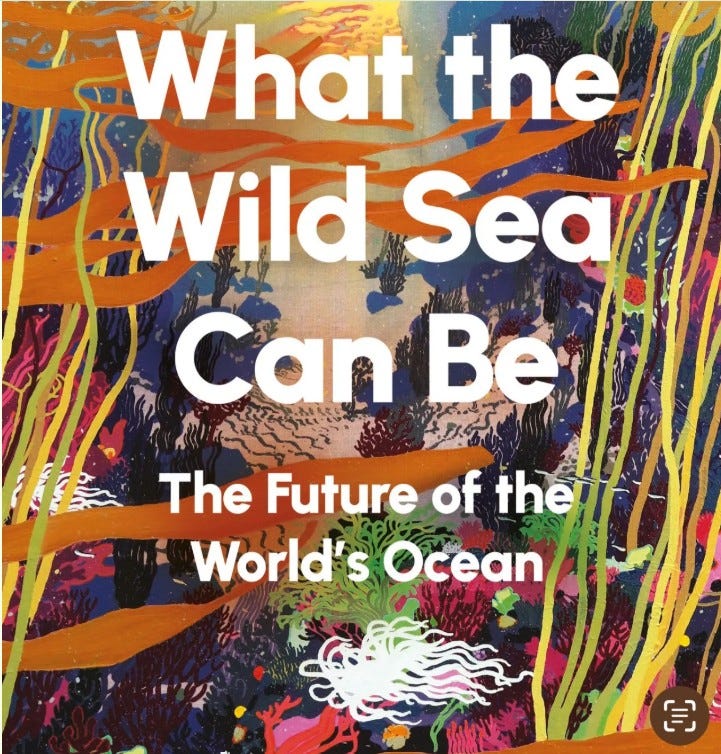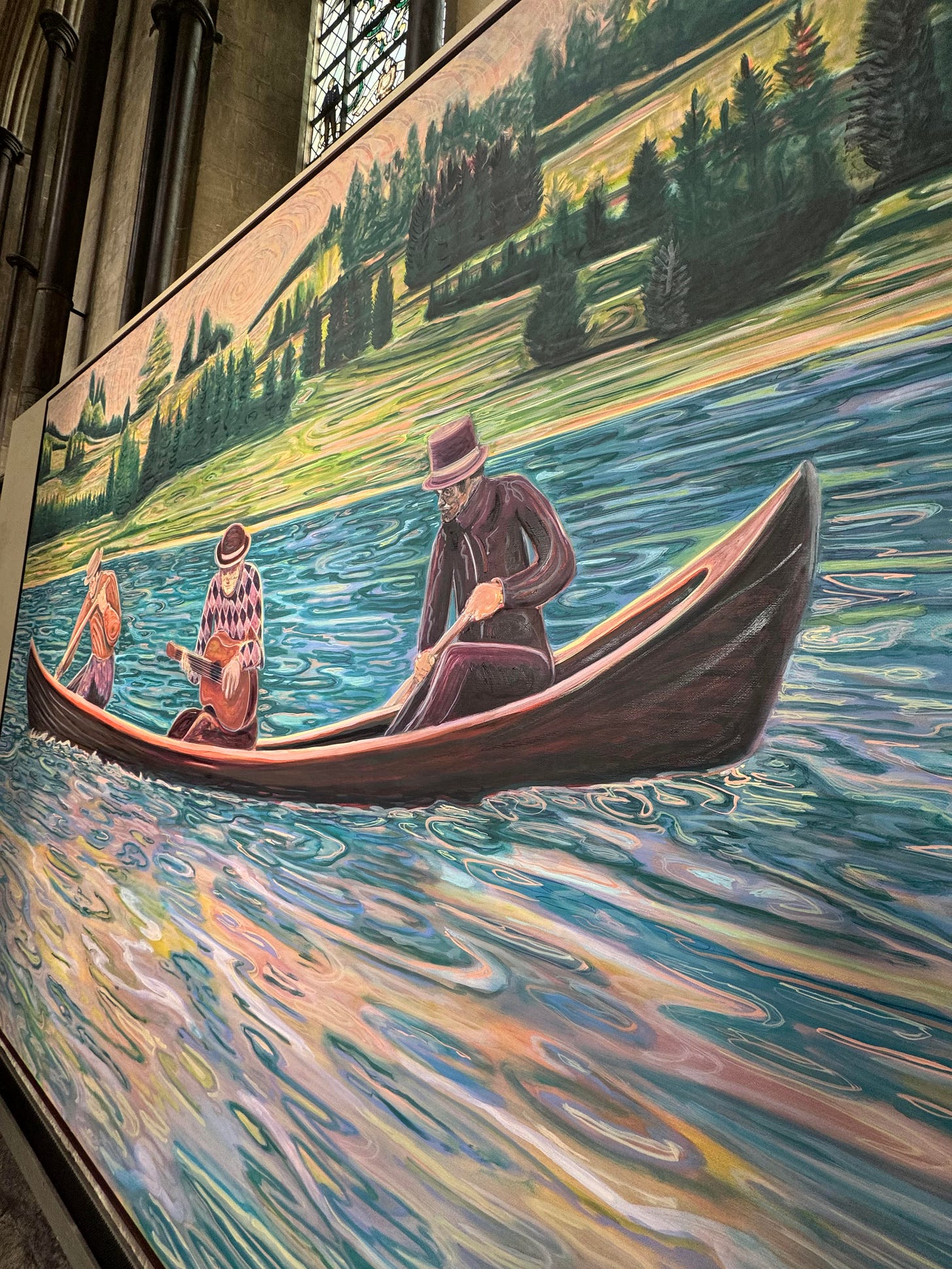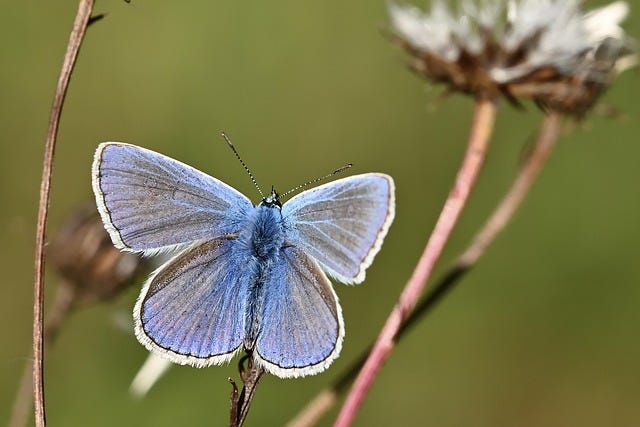Inside Salisbury: Exhibition and Author Event Reviews plus Citizen Science project
Review: Dr Helen Scales, water-themed author talk and more
By Annette J Beveridge
Environmental tragedies intermingled with positivity and hope greeted the audience at the first of the Cathedral’s water-themed author events.
Dr Helen Scales, a marine biologist, writer and broadcaster, spoke of the message behind her book: What the Wild Seas Can Be.
Her passion for the ocean and wildlife was evident but not unexpected considering her chosen career. She was enthusiastic, comfortable in front of an audience, and her calm conviction resonated.
Helen shared her experiences gained while on a Shetland island, where the enormity of the gannet population was revealed to her. We watched footage she had taken of gannets soaring over the waves and diving beneath. What a spectacle.
This was a trip that changed her and revealed the devastating impact of bird flu when scanning the area, she realised there were so many dead gannets strewn everywhere.
It was an interesting talk. As a nature lover myself, I felt the highs and lows of her experiences. When she talked about the devastating loss of Emperor Penguins, where melting sea ice led to the loss of potentially thousands of chicks, it was easy to imagine such a scene. But she also spoke about the wonders of previously unknown coral reefs, the joys of seeing turtles, sharks and octopus and brought to life those scenes with a sense of earnestness and honesty.
I had to smile when she talked about one special octopus encounter. The octopus was in a crab pot, and she described her joy at watching it feed happily with bits of crab in its many tentacles. I conjured up an image of an exceedingly smug octopus. It wasn’t trapped, it was just taking advantage of a free meal.
Octopuses are known for their intelligence after all.
Read more: Saintly stitchers embark on collaborative project
Helen is a diving enthusiast. She regaled stories about sharks and the wonders of diving in a healthy ecosystem. For her, a great dive was when she could see sharks, manta rays, turtles and plenty of fish all around her.
Having snorkelled with an octopus myself, it is these connections with nature that fill us with joy and wonder.
We all know there are many environmental threats, from deep-sea trawling to harmful bycatch, but the good news is that people like Helen are making a difference. Just by talking about the wonders of the natural world, it inspires us to make small changes and adaptations that can make a real difference.
The talk overall was inspiring. It was possible to see that with more protected marine reserves, fish populations can recover, including the Atlantic Tuna.
We do need to change how we see ocean life, though. Fish are not just food for us, they are an important part of an ecosystem, which is already heavily under pressure due to global warming and over-fishing. The core message is that we need to do more, but as Helen mentioned, groups are taking direct action and putting pressure on governments and decision-makers.
Review: Living Water Exhibition
I popped into Salisbury Cathedral the other day to take a look at the Living Water Exhibition, which brings together artists who use water as both a symbol and an inspiration.
The pleasure of seeing art is a personal one. We all like different things and can only try to interpret the paintings through our own perception. We can study each brushstroke, or each pattern or fold of fabric, and we can just enjoy art for its own sake.
The Living Water theme is an inspired one. It conjures up depth, movement, and colour. Water can be still or soothing, or we can feel its power. Water is alive, and it connects us to the natural world.
Some of the paintings are huge, and you can see something different within them by viewing from alternate angles. I particularly enjoyed Ryan Mosley’s paintings. They are filled with colour and convey depth and movement. Painted in oils, these are striking paintings.
If you plan to go to the exhibition, take the time to enjoy a wander around.
The whole point of visiting an exhibition is to embrace each work of art, but in this setting, it was also a chance to enjoy the stillness. I went when there were only a few people there, so could wander around at leisure. I was probably there for an hour, and started with the exhibition in the Cloisters and then visited the main part of the Cathedral.
It was an enjoyable hour. We have this amazing Cathedral on our doorstep with many exhibitions and events, so it is always a pleasure to attend when I can.
If you fancy viewing the exhibition for yourself, remember, residents in certain postcodes can attend for free. Just be sure to bring some ID and proof of residency.
Citizen Science: Counting Butterflies
Following the 2024 Big Butterfly Count where the results were alarming, the Butterfly Conservation Charity has declared an emergency.
Now in its 16th year, the annual citizen science programme sees thousands of people out in their gardens or local parks to spend just 15 minutes counting butterflies to help track trends.
During the 2024 count, participants generally spotted just seven butterflies in the designated 15 minutes - a reduction of almost 50% on the count in 2023.
Head of Science at Butterfly Conservation, Dr Richard Fox, said: “We need everyone, everywhere, to get out for the Count this year and help us find out if last year’s shocking results were a blip, or if they indicate a much greater issue.”
As an indicator species of a healthy environment, it is important to understand how butterflies are responding to climate change and pollution.
The Big Butterfly Count takes place from 18 July - 10 August 2025
Inside Salisbury: Spiritual celebration looms at Stonehenge but how much do you know about this monument?
A SPIRITUAL celebration that draws thousands of people from all across the world to mark the end of spring is to take place this week.








